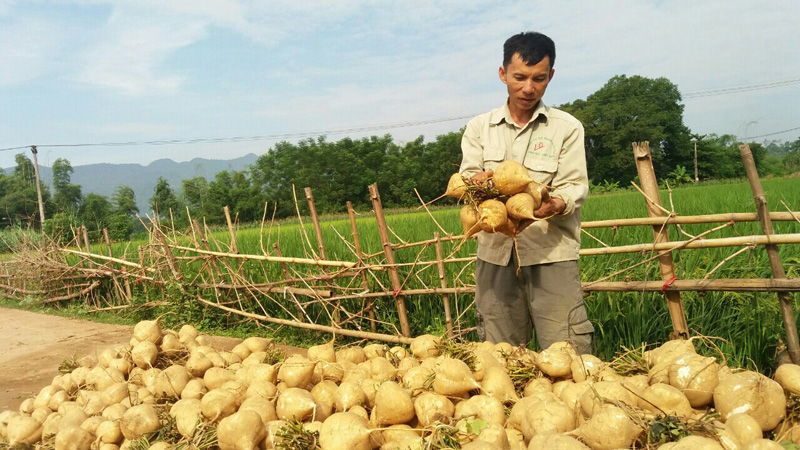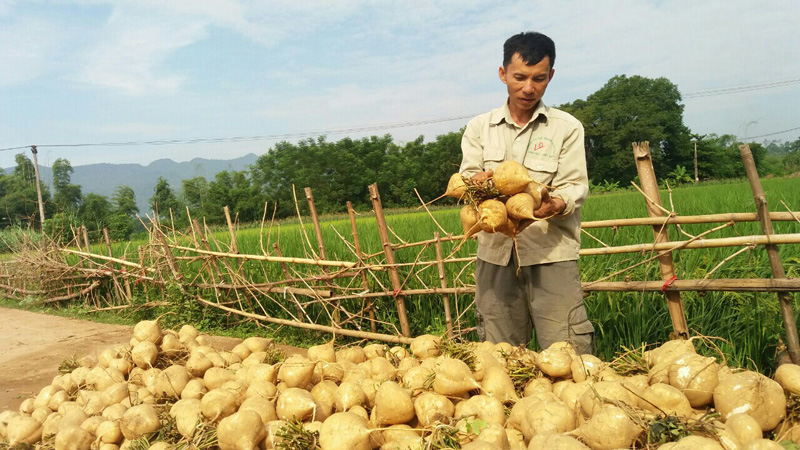
(HBO) – Tan My commune in Lac Son district, the northern mountainous province of Hoa Binh, has a total area of over 3,000 hectares, of which more than 2,700 hectares are arable land. Over the past years, under the leadership of the local Party Committee and administration, residents in the commune have actively shifted the crop and livestock structures, helping improve their living standards.

Bui Van Mung’s family in Kho hamlet, Tan My commune, Lac Son
district, has invested in growing pachyrrhizus tubers in an effort to raise income.
Over the past time, farmers in Tan My
commune have actively transferred crop and livestock structures and focused on
goods production. With abundant natural land, locals have spurred economic
development by growing sugarcanes, citrus trees, acacia trees and short-term
industrial plants like gourd, pachyrrhizus and chilli. They mostly raise
animals in farms. The commune has two large-scale breeding farms. More than 143
households in the locality have participated in service business activities.
Along with economic development,
local infrastructure has also received investment. The State has helped with cement
while local residents contributed workdays and land, as well as money to buy
sand and gravel. Thanks to such joint efforts, the whole of the 5.77-km road in
the commune has been concretized. Local schools have also been upgraded,
meeting teaching and learning demands of teachers and students at different
levels. Besides, the standard medical centre has also satisfied primary health
care demands of local people.
With the achievements, as of the end
of 2016, Tan My basically met all the 19 criteria of a new-style area. Rural
areas in the commune have been given a facelift and its economic life improved
significantly. In 2018, the commune’s average per capita income reached 31.5
million VND. The number of poor households was brought down to 9.7 percent.
Currently, the commune is focusing on maintaining and improving the quality of
new-style rural area criteria, aiming to raise material and spiritual life of
local people.
According to data from the Hoa Binh Provincial Party Committee, the industrial production index for the first six months of 2025 is estimated to have increased by 20% compared to the same period last year. This marks the highest year-on-year growth rate for this period since 2020.
In the first six months of 2025, Hoa Binh province’s export turnover was estimated at 1.145 billion USD, marking an 18.11% increase compared to the same period in 2024. Import turnover was estimated at $ 804 million, a 17.15% increase, which helped the province maintain a positive trade balance.
The lives of the ethnic minority farmers in Tan Lac district have gradually improved thanks to the new directions in agricultural production. This is a testament to the collective strength fostered through the professional associations and groups implemented by various levels of the district’s Farmers’ Union.
With the motto the "product quality comes first,” after nearly one year of establishment and operation, Muong village’s Clean Food Agricultural and Commercial Cooperative, located in Cau Hamlet, Hung Son Commune (Kim Boi district), has launched reputable, high-quality agricultural products to the market that are well-received by consumers. The products such as Muong village’s pork sausage, salt-cured chicken, and salt-cured pork hocks have gradually carved out a place in the market and they are on the path to obtaining the OCOP certification.
In the past, the phrase "bumper harvest, rock-bottom prices" was a familiar refrain for Vietnamese farmers engaged in fragmented, small-scale agriculture. But today, a new spirit is emerging across rural areas of Hoa Binh province - one of collaboration, organisation, and collective economic models that provide a stable foundation for production.
Maintaining growing area codes and packing facility codes in accordance with regulations is a mandatory requirement for agricultural products to be eligible for export. Recently, the Department of Agriculture and Environment of Hoa Binh province has intensified technical supervision of designated farming areas and packing facilities to safeguard the "green passport" that enables its products to access international markets.



